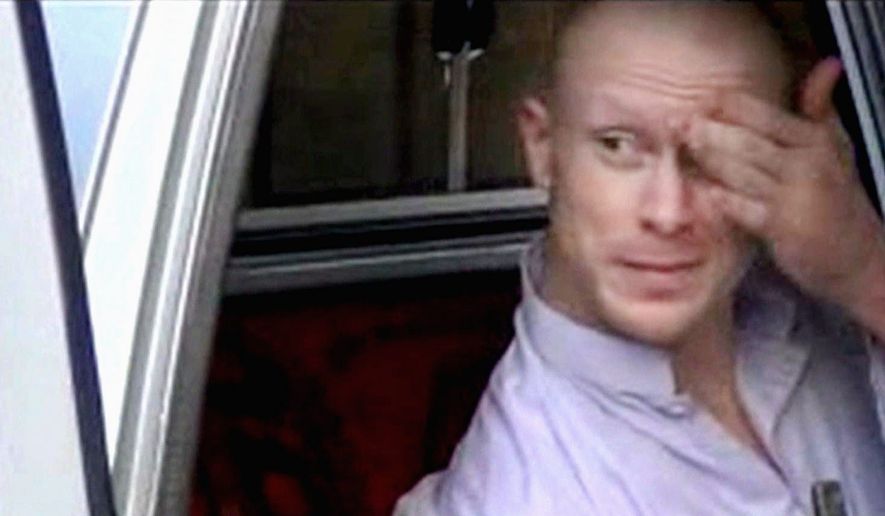The Army would have to give Sgt. Bowe Bergdahl an honorable discharge because he is past his active duty commitment, unless it proceeded with a court martial, a legal expert says.
The question comes down to Army regulations that dictate how service members are discharged. Those still serving their enlistment commitment are treated differently than someone such as Sgt. Bergdahl, who has completed his agreement and is on an administrative hold.
A nonhold active duty soldier whom the Army wanted to discharge could be sent to an administrative board.
But not Sgt. Bergdahl. He is awaiting an Army decision on whether he will face criminal charges for walking off his base in Afghanistan on June 30, 2009, and becoming an enemy captive until last May.
“You can’t administratively discharge someone after their EAS [end of active service] has expired,” said Charles Gittins, an attorney and expert on military law. “If he is on legal hold, they either court-martial him or discharge him with his honorable discharge.”
If the Army wants to seek an other-than-honorable discharge, he said, it would have to pursue criminal charges. At that point, there is a regulation that would allow the soldier to negotiate a less-than-honorable discharge in lieu of a trial, Mr. Gittins said.
Conviction at court martial could bring a bad conduct or dishonorable discharge.
Maj. Gen. Kenneth Dahl, the officer tapped to investigate Sgt. Bergdahl’s actions in Afghanistan, has completed his report and submitted it to the office of Army Secretary John McHugh.
A source familiar with the probe say Sgt. Bergdahl has denied that he deserted and provided an explanation for why he walked away that day. Soldiers from Sgt. Bergdahl’s unit have accused him of desertion.
Sgt. Bergdahl is now at Fort Sam Houston, Texas, assigned to the company headquarters, where he was interviewed last August by Gen. Dahl. Also present was the soldier’s attorney, Eugene Fidell, who specializes in military law and teaches at Yale Law School.
“He answered every question that was put to him,” Mr. Fidell told The Washington Times. “I came away extraordinarily impressed by Gen. Dahl. I thought the country is lucky to have him. And sort of wonder what the rest of his career trajectory will look like, because I wish him well.”
Gen. Dahl, a West Point graduate who completed two combat tours in Afghanistan, is a well-respected battlefield commander. He is now deputy commander of Army I Corps at Joint Base Lewis-McChord in Washington.
The source familiar with the investigation did not know Gen. Dahl’s conclusions, which have ramifications beyond the fate of Sgt. Bergdahl himself.
Conservatives harshly criticized President Obama for not only releasing five hardened Taliban leaders to gain Sgt. Bergdahl’s release, but also for failing to notify Congress ahead of time, as required by law.
A finding that Sgt. Bergdahl deserted and faces court-martial would bolster the argument that Mr. Obama endangered troops in Afghanistan for the benefit of a deserter.
The president announced Sgt. Bergdahl’s release with great fanfare, bringing the parents, Robert and Jani Bergdahl of Hailey, Idaho, to the White House for a joint appearance.
National Security Adviser Susan Rice told ABC News that the soldier “served the United States with honor and distinction.”
She said Sgt. Bergdahl “wasn’t simply a hostage; he was an American prisoner of war captured on the battlefield.”
The White House praise brought waves of rebuttals from the sergeant’s battlemates, who went on TV and radio. They painted the picture of a loner who simply abandoned them one morning by walking away from Combat Outpost Mest-Lalak in Paktika Province. Worse, they said, people died in combat while searching for him.
“The American people need to be educated that Bowe Bergdahl is not a hero,” Joshua Cornelison, the medic in his platoon, told “Fox News Sunday.” “After Bowe Bergdahl purposely and willfully walked away, every single mission was titled toward finding him.”
The source familiar with the investigation said that the sergeant, while a captive for nearly five years at the hands of the extremely violent Haqqani network in Pakistan, tried to escape and was abused.
“It is actually surprising how well he withstood abuse,” the source said.
A Rolling Stone article quoted then-Private Bergdahl’s emails as expressing disenchantment with his combat role in Afghanistan.
House Armed Services Committee member Duncan Hunter, California Republican, has accused the Pentagon of orchestrating a ransom payment for Sgt. Bergdahl, then being taken in by an “Afghan intermediary.”
He wrote in a Nov. 5 letter to Defense Secretary Chuck Hagel that Joint Special Operations Command (JSOC), the home of SEAL Team Six and Army Delta Force, paid money earlier this winter. The go-between took the cash, disappeared and never helped to gain the soldier’s release, Mr. Hunter wrote, citing confidential sources.
The Pentagon denied it made a ransom payment. The congressman has asked the Defense Department inspector general to investigate.
Navy Rear Admiral John Kirby, Mr. Hagel’s press secretary, said the defense chief was to be briefed on the Dahl probe on Friday. But, he said, it’s up to the Army to make decisions. He said that generally reports such as Gen. Dahl’s are not released publicly if there are judicial proceedings to follow.
“It’s for the Army to decide what the next steps are,” he said. “They’re not going to go any faster than they need to go in terms of process.”
He added, “I suspect that at the appropriate time, the Army will make the investigation public.”
• Rowan Scarborough can be reached at rscarborough@washingtontimes.com.




Please read our comment policy before commenting.